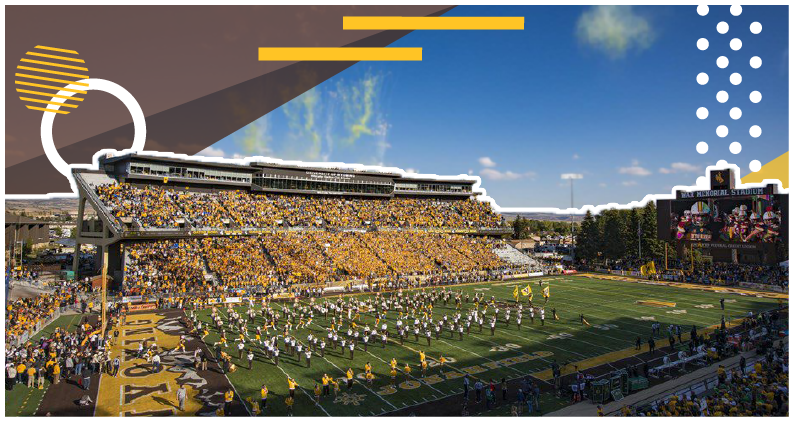
How Does College Differ from High School?
Riley B.
Published June 06, 2022
7 Minute Read
When I first got to college, I walked around the halls of a building I was unfamiliar with. I wanted to explore the building, see where my classes were and just start to get myself familiar with a place I had never been. I passed many offices and professors, and I waited for someone to stop me, ask for my hall pass and tell me to stop walking around. That never happened. And at that point, I knew that college was going to be very different from high school.
Here are some things you may want to know when it comes to those differences:
1. Schedule
High School:
High school schedules have strict guidelines and leave little up to the students.
Your schedule is probably filled from the start of school (approximately 8 a.m.) to
the end of school (approximately 3:30 p.m.). Also in high school, you’re typically
taking 6-8 classes per semester and probably indulge in sports or clubs when school
is out. So, you’re pretty busy from 8 a.m. to 5 p.m. or later depending on what you
need to get done after your activities.
College:
College schedules are almost solely up to the student. An advisor will help students
create their schedule based on their major, but it is up to the student to know which
classes they need to take. This information can be found within each student's degree program. You also usually pick your elective classes and can have a lot of flexibility within
your program of choice! To be considered a full-time student at UW, you must take
12 hours a semester which is typically 4 classes, however, some students take on more
hours than that!
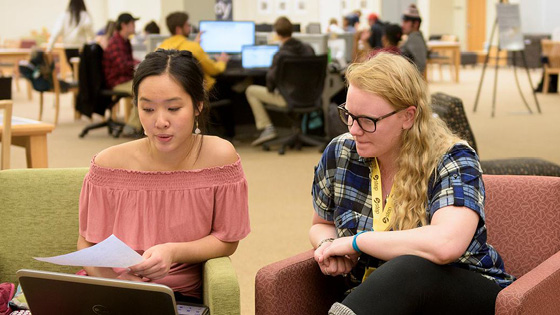
2. Class Time
High School:
Many high school classes look one of two ways; either a schedule will have 6 classes
per day with 45-60 minutes for each class or alternating class days with 90 minutes
per class. In most cases, students will take the same class every day of the semester.
College:
Class times for college students depend solely on the class, and students may get
to choose which time slot they prefer for some classes (hot tip: do not choose an
8 a.m. unless you are a morning person). Monday, Wednesday, Friday classes typically
last 50 minutes while Tuesday, Thursday classes last 75 minutes. Sometimes “night”
classes are offered, and these are two- and half-hour classes, once a week, typically
in the evening. Don’t forget about labs!
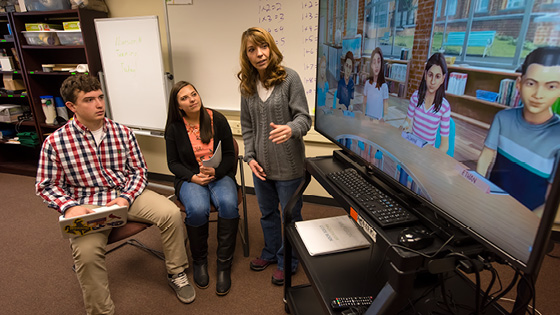
3. Class Size
High School:
The average class size for high school is around 30 students with 18 students being
the average in Wyoming high schools.
College:
College class sizes vary significantly. Some intro classes can be upwards of 100 students,
while more specific classes may have less than ten. You’ll see as you progress through
your degree that your class sizes will get smaller, and you will start to be with
more of the same people – because those are the people in your program!
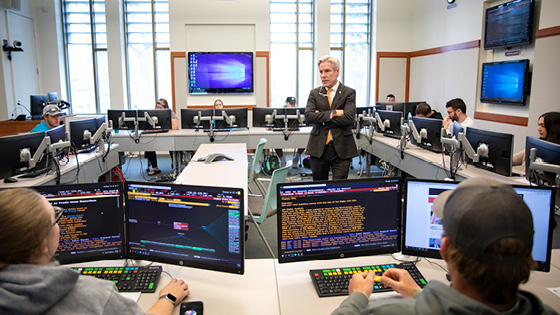
4. Time Management
High School:
Your time is structured depending on other people, including your teachers, counselors,
coaches and administrators. Most of the time, you must work within their schedule.
College:
College is the time for growth in this area. While some professors require attendance,
it is ultimately up to you to attend class, find time for studying, go into professors’
office hours if needed and participate in extracurriculars. It is a huge balancing
act, but I assure you, you will get the hang of it. It’s just a little change of pace!
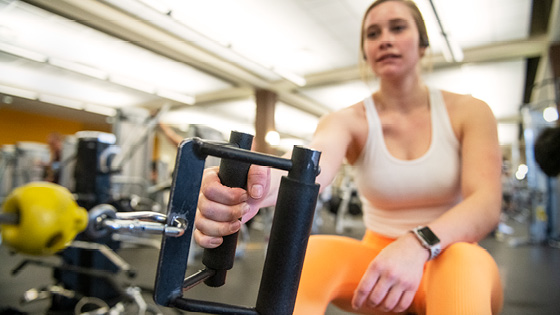
5. Homework
High School:
Homework in high school is usually assigned by the end of class and due at the beginning
of the next class. On most occasions, students know what the homework is on a class-to-class
basis. You will also usually get plenty of reminders of due dates in high school.
College:
Almost all homework assignments are laid out in the syllabus at the beginning of each
semester. It is up to you to stay on track, get ahold of these assignments and get
them done by the time they are due. Every professor is different in reminding their
students about these assignments, so just stay on top of it and don’t always rely
on your professors! However, they're there to help you, so don't be shy with asking
questions on assignments when needed.
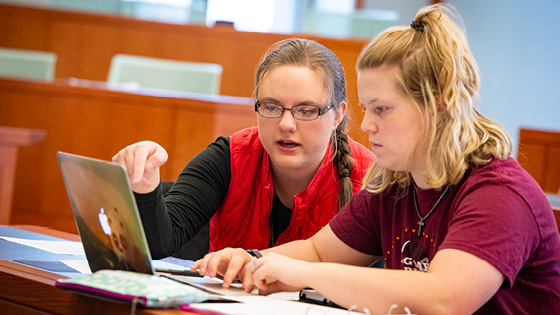
6. Studying
High School:
Studying in high school is primarily structured by the teacher. Teachers will provide study guides, testing help and other activities to help students retain information.
College:
Studying in college is an internal job for the most part. Make sure to take notes
throughout the semester so you can come back to them whilst studying. Whether good
or bad, this one’s on you. Study groups are also a great way to stay accountable and
get help with concepts you’re unsure of. Some classes even have Supplemental Instruction (SI), so be sure to join those as much as you can too!
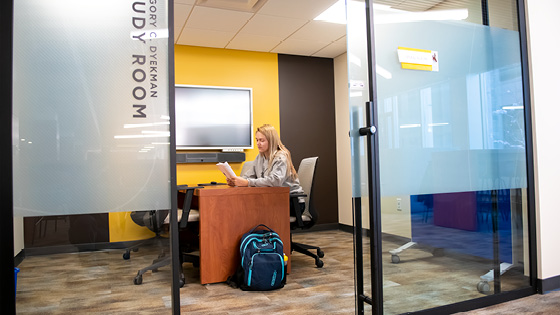
7. Testing
High School:
Thinking back to high school, it felt like there was a test almost every week. Tests
in high school classes are much more common and happen on a much more frequent basis.
College:
In college, tests are more infrequent, but they are typically more impactful. You
should expect one to four major tests a semester per class. Midterms and finals are
also big in college! While not every professor participates in a midterm exam, you
can almost always expect a final exam or project for each class (the structure is
dependent on the professor). However, there are some professors out there who don’t
do tests at all!

8. Graduation Requirements
High School:
Commonly, high schools require an average GPA of 2.0 to graduate. You will most likely
need a D or higher in each of your classes.
College:
At the University of Wyoming, undergraduates need an average 2.0 GPA to graduate.
At the graduate level, students will need an average 3.0 GPA.

9. Expenses
High School:
If you went to a public high school, you may know that almost all of your expenses
are paid for. You do not need to own your own computer, and textbooks and materials
are provided by the school. You probably only needed to chip in on trips for clubs
and sports.
College:
Well, we all know it’s not free. For an entire school year (before aid), first-year Wyoming residents may expect to pay roughly $18,000 a year in tuition and fees. Non-residents may expect to pay roughly $33,000 in tuition and fees. Depending on your situation, finances and accommodations, these prices may change.
UW Cost of Attendance
10. Social Life
High School:
It’s one big hierarchy, isn’t it? In high school, you will see different cliques,
popular students and overall comradery. Everyone knows everyone by the end of their
four years and that can cause major drama, but that can also be super fun!
College:
Try to get rid of your fear that people are judging you here. Barring a few bad apples,
college students are much more mature and welcoming. We’re all more worried about
balancing life and finding genuine friends than being popular. You'll find your people
here and make long-lasting relationships. Just ask anyone that’s been to college –
it’s just how it works!

11. Activities
High School:
High school provides students with a multitude of different activities to join, including
student council, sports, band and other clubs. It is easy and encouraged to participate
in everything you can.
College:
The same principle applies in college. Joining a club on campus, such as ASUW – the student government on campus, club and intramural sports and Student Organizations, is encouraged. There's something for everyone, so take
your time and check out everything!

12. Campus Events
High School:
Homecoming, prom, basketball and football games are all important events in high school,
but festivities can sometimes be overlooked when it comes to school-wide events. There
isn't much in high school as far as events go. It only contains the most iconic events,
as many high school activities are exclusive to certain organizations or groups.
College:
Yes, there are still many events that are specific to certain clubs. However, UW has
many university-wide events throughout the entire school year hosted by 7220 Entertainment, colleges and athletics, among others. Some events include game nights, comedians,
magicians, drag shows, sporting events, speaker series and more. At the end of the
year, there are even full concerts at Union Fest!
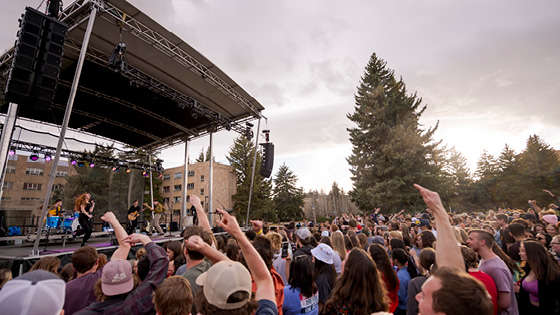
To Wrap It All Up:
High school may have been the time of your life, or it may have not suited you well. Either way, college is a completely different beast than high school. Try new things, hold yourself accountable and learn to be optimistic for the future! This next step of your journey is in your own hands; feel excited!
Ready to apply to UW?
Apply Now
